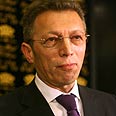
France: Gaydamak gets 6 years in jail
Israeli-Russian businessman and his partner, French businessman Pierre Falcone, sentenced in Paris to six years in prison for their involvement in arms sales worth $790 million to Angola in 1990s
Israeli-Russian businessman Arcadi Gaydamak and his partner, French businessman Pierre Falcone, were sentenced Tuesday in Paris to six years in prison for their role in Angolagate, a case of arms sales worth $790 million to Angola in the 1990s.
The huge arsenal - 420 tanks, 150,000 shells, 170,000 anti-personnel mines, 12 helicopters, six warships - shored up President Eduardo Dos Santos's regime during its vicious bush war against the UNITA rebels.
Gaydamak's lawyer said he would appeal his conviction in the affair and the six-year sentence handed down to him by the French court.
"Gaydamak was acquitted of half of the charges against him, and, despite this, was still sentenced to six years in prison. This is unfortunate. Of course, we intend to submit an appeal," said the lawyer.
Gaydamak's other lawyer, Attorney William Goldnagel, said that his client was "a victim of political and legal games." In statements made to Russian news agency Novosti, Goldnagel said that he intends to submit an appeal, but that he must consult first with Gaydamak.
Angola pushed to have the trial abandoned, while President Nicolas Sarkozy flew to Luanda in May 2008 to mend ties strained by the case.
Observers believed a harsh verdict could poison France's relations with Angola, where it hopes to develop massive oil contracts.
Gaydamak, who is currently staying in Russia, was not present for the reading of the sentence. French authorities have issued an arrest warrant against the Russian business man. Another indictment stands against Gaydamak in Israel for money laundering and fraud of NIS 650 million (about $175.4 million).
'He probably won't go to jail'
Attorney Irit Kahan, former director of the international division in the State Prosecutor's Office, explained that the fact Gaydamak holds Russian citizenship works in his advantage because he apparently will not be extradited to Israel or to France. "Russia almost universally does not extradite Russian citizens to other countries," Kahan told Ynet.
According to her, even if Russia did extradite Gaydamak to France, he would not be able to start serving his sentence immediately. "If he were extradited to France, because the trial was conducted without his presence, the procedure there is usually that once the person is extradited, the trial against him must be reopened as soon as he is present," she said.
Kahan explained that a number of conditions are necessary to allow for extradition. "A main condition is that there must be double criminality," she said. "In offences like murder or theft, the double criminality is clear. But in this specific case, a problem is likely to arise because the offence in France needs to exist as an identical and specific count in Israeli court."
Gaydamak promised to return to Israel to stand trial for money laundering, and even put down a considerable bond to this end. However, in the meantime, initial proceedings in the trial have been delayed. Even if he would come to Israel, it is not at all clear whether Israeli authorities would extradite him to France.
According to Kahan, "There is a possibility that following the verdict in Israel that the authorities would extradite him, but not before the end of the trial against him."
The arms sales began when Socialist president Francois Mitterrand was president in 1993 but continued until 1998, three years after conservative Jacques Chirac's election.
Mitterrand's son and former Africa advisor, Jean-Christophe, was sentenced to two years probation on charges of accepting millions of euros in "consultant fees" on the arms deals between 1993 and 1998.
Former French Interior Minister Charles Pasqua was sentenced to one year in prison.
From October 2008 to March this year, judges struggled to make sense of a labyrinth of murky deals linking French politicians, businessmen and public figures and a massive arms shipment to a war-torn African country.
Prosecutors claim the shipment was in itself illegal, although the main defendants dispute this, and allege many millions of dollars were skimmed off the contract to pay bribes to senior French and Angolan figures.
But despite a promise to come and explain his role, Gaydamak has remained in Israel. He is said to have used his contacts in Eastern Europe to get his hands on the Soviet-designed weapons that were shipped to Luanda.
Falcone, who holds French, Canadian and Angolan citizenship, was named Angola's ambassador to the United Nations Paris-based cultural organisation UNESCO in 2003 and has claimed diplomatic immunity in the case.
Several defendants have insisted the trade was carried out in full view of French authorities but that Paris kept quiet to shore up a regional ally and protect an important source of oil.
Liron Sinay and Olga Gouresky contributed to this report










